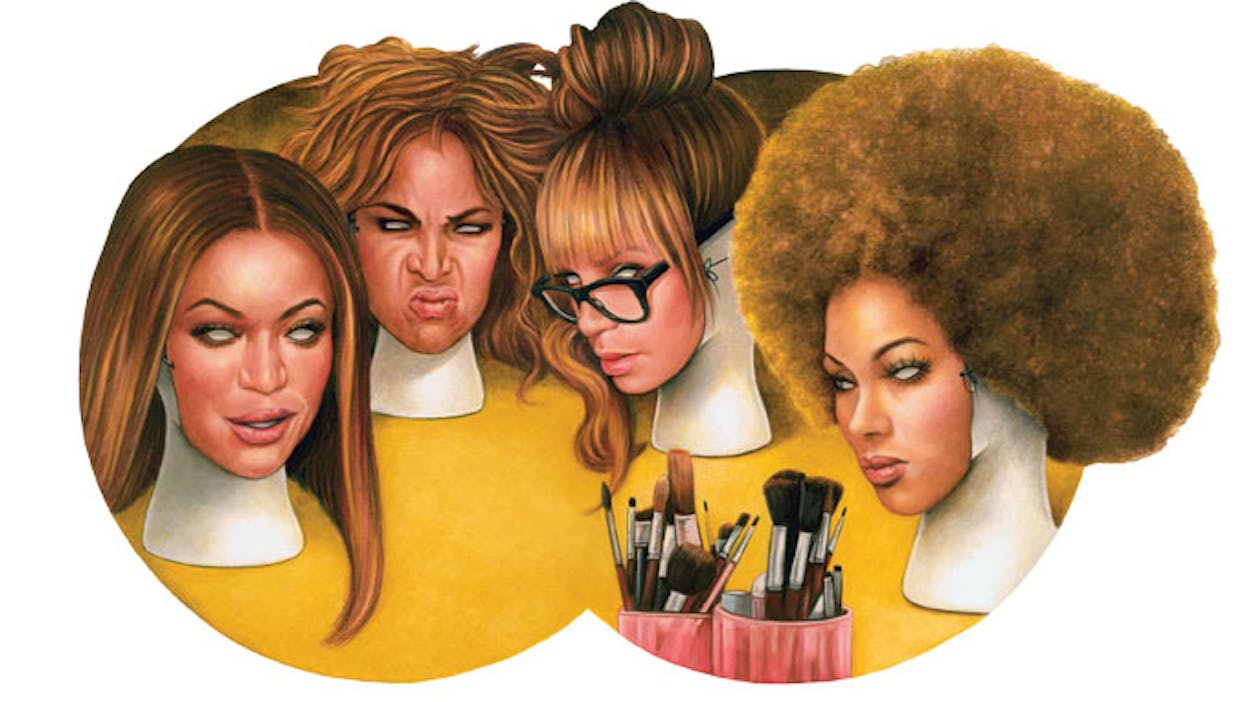1. Independent Woman
On May 24, Twentieth Century Fox will release the computer-animated movie Epic, in which Beyoncé, arguably the biggest star of our time, will voice the role of Queen Tara, the empress of a microscopic kingdom. What could be more appropriate?
Think about it. Over the past year or so, Beyoncé has had a run unparalleled in modern show business: she gave birth to her first child (which she went halfsies on with the most successful rapper in history), was slagged for lip-synching a song at the president’s second inauguration, redeemed herself with a dominating halftime performance at the Super Bowl, co-directed and produced an HBO documentary about herself, served as part of the inspiration for the award-winning novel Billy Lynn’s Long Halftime Walk, and released a single, “Bow Down,” that turned her career-long advocacy for female empowerment on its head. To cap it off, her Mrs. Carter world tour (perhaps, by the time you read this, supplemented by a new album) has just commenced.
And yet, despite her cultural ubiquity and knack for instigating controversy—Did she fake the pregnancy? Did she get a nose job? Is she a member of the Illuminati?—Beyoncé has never seemed less present in our lives. One problem is that we know too much about her; the more we see of her, the less we can project onto her. Another problem is that we know too little about her. Her contradictions don’t hint at hidden depths—they just negate each other, until nothing’s left but Beyoncé Knowles, ruler of a very tiny empire. Population: 1.
—Shea Serrano
2. Museum Accomplished
On May 1, the George W. Bush Presidential Library and Museum, in Dallas, will open its doors to the public, making it the third presidential library located in Texas. No other state houses three federally administered presidential libraries (California has two, thanks to Richard Nixon and Ronald Reagan), a testament to our talent for getting Texans elected as leaders of the free world. Constructed at an estimated cost of more than $200 million, the library is the most expensive institution of its type in the country. How, exactly, does it stack up against its brethren in Austin and College Station?
3. Here’s Your Trouble
The Pistol Annies’ second album starts with a rowdy ode to infidelity, ends with a sober ode to monogamy, and covers plenty of ground—heartbreak, having casual sex to get over heartbreak, falling off the wagon because casual sex didn’t get the job done—in between. It’s not apparent who’s responsible for what on Annie Up (RCA Nashville); Ashley Monroe, Angaleena Presley, and the country trio’s alpha female, Miranda Lambert, co-wrote most of the songs. But Lambert’s reckless attitude is all over the place, especially in lines like “Been taught to love / But I love to hate.” Still, the quieter songs—largely Monroe’s doing, presumably—hold their own against the scenery-chewing of America’s Favorite Spitfire and are no less likely to push Nashville boundaries: both the raucous “Hush Hush” and the epic downer “Blues, You’re a Buzz Kill” take it as a given that a woman in pain will turn to pills or weed. If that sort of indifference to popular sentiment brings to mind the Dixie Chicks, Annie Up makes clear the contrast between the two: The Chicks serve as a cautionary tale about bucking the Nashville machine. The Pistol Annies show how much you can get away with from inside of it.
4. The One-Question Interview: Philipp Meyer
The Son (Ecco) may be the book Texas readers have been waiting for since Lonesome Dove: a big novel brimming with flinty pioneers, fierce Comanche, and tangled bloodlines. Remarkably, this book, so steeped in Lone Star history, was written by an East Coaster who moved to Texas as an adult.
Q: What research did you do to get the battle scenes right?
A: I took a bunch of classes at Blackwater: How do you win, or lose, a gunfight? How do you clear a house? What happens to your mind in those situations? Interviewed a ton of combat vets. All the philosophical stuff about combat—“You have to love other people’s bodies more than your own”—comes from them. Shot thousands of arrows in random situations, at animals and through brush, to see what happened to them. Didn’t have much experience riding horses, so I took lessons. Found out I’m allergic to horses.
5. The Battle Over UT: The Final Exam









